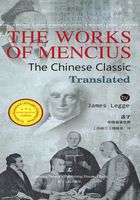
CHAPTER VIII
1. Mencius said, 'When any one told Tsze-lû that he had a fault, he rejoiced.
2. 'When Yü heard good words, he bowed to thespeaker.
3. 'The great Shun had a still greater delight in whatwas good. He regarded virtue as the common property of himself and others, giving up his own way to follow that of others, and delighting to learn from others to practise what was good.


5. 仁者=欲为仁之人. Compare Analects, III. vii and xvi.
CHAPTER 8. HOW SAGES AND WORTHIES DELIGHTED IN WHAT IS GOOD.
1. Tsze-lû's ardour in pursuing his self-improvement appears in the Analects, V. xiii; XI. xxi. But the particular point mentioned in the text is nowhere else related of him.
2. In the Shû-ching, II. iii. I, we have an example of this in Yü. It is said,—禹拜昌言, 'Yü bowed at these excellent words'.
3. 善与人同 is explained by ChûHsi 公天下之善而不为私也, 'He considered as public—common—the good of the whole world, and did not think it private to any.'Shun's distinction was that he did not think of himself,as Tsze-lû did, nor of others, as Yü did, but only of what was good, and unconsciously was carried to it,wherever he saw it.


4. 'From the time when he ploughed and sowed,exercised the potter's art, and was a fisherman, to the time when he became emperor, he was continually learning from others.
5. 'To take example from others to practise virtue,is to help them in the same practice. Therefore, there is no attribute of the superior man greater than his helping men to practise virtue.'